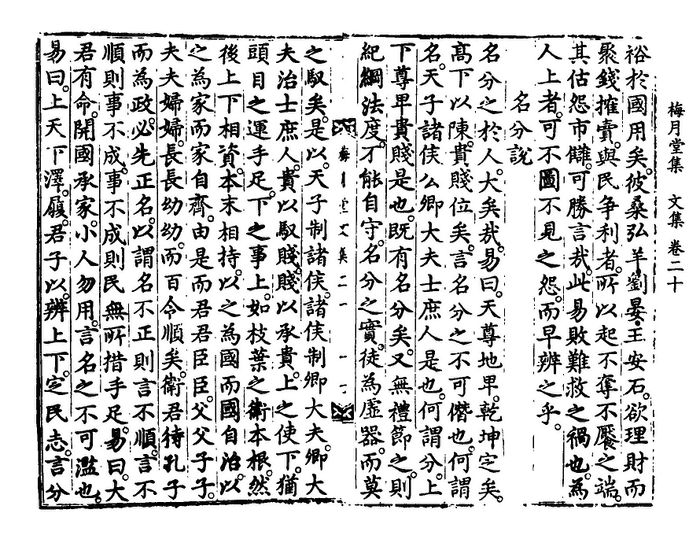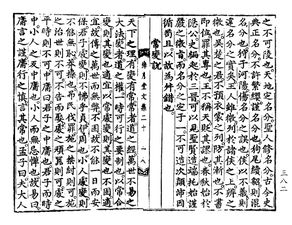"(Translation) 金時習 名分說"의 두 판 사이의 차이
Jangseogak (토론 | 기여) |
Russellguilbault (토론 | 기여) |
||
| 94번째 줄: | 94번째 줄: | ||
---- | ---- | ||
| − | + | Among people, title and distinction is a great matter. The ''Yijing'' says: "Heaven is venerable and the earth is base. Thus are ''gan'' and ''kun'' settled. The higher and lower are displayed [?]; thus the noble and mean have their places." Thus we speak of the impossibility of overstepping title and distinction. What is title? It is the Son of Heaven's being visited by the multitude of dukes, marquises, and great ministers. What is distinction? It is upper and lower, venerable and base, noble and mean. If one only has title and distinction, but does not control it with ritual, then one cannot protect discipline and regulations by oneself. This is the essence of title and distinction; in vain it becomes an empty vessel, and nobody can control it. | |
==='''Student 8 : (Write your name)'''=== | ==='''Student 8 : (Write your name)'''=== | ||
2019년 7월 2일 (화) 10:38 판
| Primary Source | ||
|---|---|---|
 |
Title | |
| English | ||
| Chinese | 名分說 | |
| Korean(RR) | 명분설(Myŏngbunsŏl [Myeongbunseol]) | |
| Text Details | ||
| Genre | Literati Writings | |
| Type | 說 | |
| Author(s) | 金時習 | |
| Year | ||
| Source | Korean Classics and Literati's Collection of Writings (한국고전종합DB) | |
| Key Concepts | ||
| Translation Info | ||
| Translator(s) | Participants of 2019 JSG Summer Hanmun Workshop (Advanced Translation Group) | |
| Editor(s) | ||
| Year | 2019 | |
목차
- 1 Introduction
- 2 Original Script
- 3 Discussion Questions
- 4 Further Readings
- 5 References
- 6 Translation
- 6.1 (sample) : Jaeyoon Song
- 6.2 Student 1 : (Yishu Ma)
- 6.3 Student 2 : Samuel Sai Hay Chan 陳世熙 진세희
- 6.4 Student 3 : Younès M'Ghari
- 6.5 Student 4 : King Kwong Wong
- 6.6 Student 5 : (Write your name)
- 6.7 Student 6 : (Stacey Lui)
- 6.8 Student 7 : Russell Guilbault
- 6.9 Student 8 : (Write your name)
- 6.10 Student 9 : (Write your name)
- 6.11 Student 10 : (Write your name)
- 6.12 Student 11 : YeonJae Ra
- 6.13 Student 12 : Wonhee Cho 趙元熙
Introduction
Original Script
| Classical Chinese | English |
|---|---|
|
名分之於人。大矣哉。易曰。天尊地卑。乾坤定矣。高下以陳。貴賤位矣。言名分之不可僭也。何謂名。天子諸侯公卿大夫士庶人是也。何謂分。上下尊卑貴賤是也。旣有名分矣。又無禮節之。則紀綱法度。不能自守。名分之實。徒爲虛器。而莫之馭矣。 是以。天子制諸侯。諸侯制卿大夫。卿大夫治士庶人。貴以馭賤。賤以承貴。上之使下。猶頭目之運手足。下之事上。如枝葉之衛本根。然後上下相資。本末相持。以之爲國而國自治。以之爲家而家自齊。由是而君君臣臣。父父子子。夫夫婦婦。長長幼幼。而百令順矣。衛君待孔子而爲政。必先正名。以謂名不正則言不順。言不順則事不成。事不成則民無所措手足。 易曰。大君有命。開國承家。小人勿用。言名之不可濫也。易曰。上天下澤。履。君子以辨上下。定民志。言分之不可陵也。天地定名分。聖人修名分。古今史典正名分。不許繁纓。謹名分也。 狗尾續貂。則混名分也。狩于河陽。傷名分之誤也。侯以不義。則違名分之實矣。王人雖微。列於諸侯之上。辨之微也。吳楚之君。不預衣裳之列。防其漸也。不書卽位。罪其專也。王不稱天。貶其謬也。春秋始於隱公。史編起於三晉。可以見聖賢造端托始謹嚴之微旨。而名分之定于一。不可造次顚沛因循苟且。以故爲舛錯也。 |
(translation) |
Discussion Questions
Further Readings
References
1. 司馬光, <<資治通鑑>>卷第一 https://ctext.org/wiki.pl?if=gb&chapter=579652
2. 김시습 in 한국민족대백과사전(Encyclopedia of Korean Culture, in Korean). http://encykorea.aks.ac.kr/Contents/Index?contents_id=E0009666
Translation
(sample) : Jaeyoon Song
- Discussion Questions:
Student 1 : (Yishu Ma)
Student 2 : Samuel Sai Hay Chan 陳世熙 진세희
Student 3 : Younès M'Ghari
Grands sont les dénominations et statuts pour les gens. Le Livre des transformations dit : "Le Ciel est vénérable et la Terre est basse, le Cosmos a (ainsi) été disposé. [...]." Ce qui est appelé "dénomination" : fils du ciel, duc, marquis, ministre, les haut fonctionnaire, bureaucrate, roturier. Ce qui est appelé "statut" :
Student 4 : King Kwong Wong
Student 5 : (Write your name)
Student 6 : (Stacey Lui)
Student 7 : Russell Guilbault
Among people, title and distinction is a great matter. The Yijing says: "Heaven is venerable and the earth is base. Thus are gan and kun settled. The higher and lower are displayed [?]; thus the noble and mean have their places." Thus we speak of the impossibility of overstepping title and distinction. What is title? It is the Son of Heaven's being visited by the multitude of dukes, marquises, and great ministers. What is distinction? It is upper and lower, venerable and base, noble and mean. If one only has title and distinction, but does not control it with ritual, then one cannot protect discipline and regulations by oneself. This is the essence of title and distinction; in vain it becomes an empty vessel, and nobody can control it.
